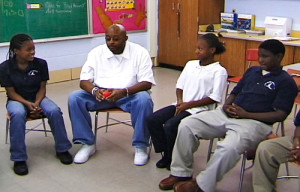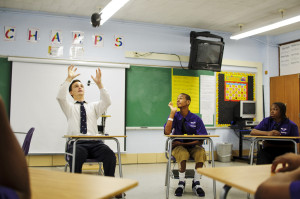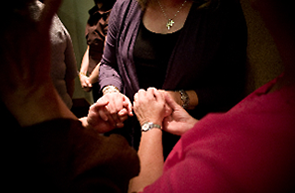News & Announcements
 This piece was written by John Macdonald discussing Hull, UK's project to become the world's first restorative city by implementing restorative practices throughout the city for public service agencies working with youth, including schools and police. He makes the case that private business would do well to examine restorative practices as a leadership model. The article first appeared under the title "Restoring Your Bottom Line: Restorative Practices in the Business Environment."
This piece was written by John Macdonald discussing Hull, UK's project to become the world's first restorative city by implementing restorative practices throughout the city for public service agencies working with youth, including schools and police. He makes the case that private business would do well to examine restorative practices as a leadership model. The article first appeared under the title "Restoring Your Bottom Line: Restorative Practices in the Business Environment."
IIRP has worked extensively with Hull, conducting trainings and offering materials that Hull uses for its trainings. Read more about Hull's efforts to become a restorative city here.
March 6 & 7, 2012, 8:30 AM – 4:00 PM
Hosted by: Lancaster Catholic High School, 650 Juliette Avenue, Lancaster, PA
Two in-service days offered in the SaferSanerSchools Whole-School Change Program
Introduction to Restorative Practices — $140 Tuesday, March 6, 2012 — Register here.
Ideally paired with Using Circles Effectively
Last week I linked to a blog post by Photographer Matt Roth about City Springs Elementary/Middle School in Baltimore and their successful use of Restorative Practices for dealing with safety issues. Today I'm reposting a piece about the Baltimore Curriculum Project, which discusses the history and context of their adoption of Restorative Practices. The original post can be found here.
 In the fall of 2005 Baltimore Curriculum Project (BCP) President Muriel Berkeley attended a workshop at the Maryland Charter School Network Conference that sparked a wholesale transformation of school culture at BCP's four neighborhood charter schools: City Springs School, Collington Square School of the Arts, Hampstead Hill Academy, and Wolfe Street Academy.
In the fall of 2005 Baltimore Curriculum Project (BCP) President Muriel Berkeley attended a workshop at the Maryland Charter School Network Conference that sparked a wholesale transformation of school culture at BCP's four neighborhood charter schools: City Springs School, Collington Square School of the Arts, Hampstead Hill Academy, and Wolfe Street Academy.
 Photographer Matt Roth posted some lovely photos recently on his blog, part of a photo shoot for an article that appeared in Education Week last summer.
Photographer Matt Roth posted some lovely photos recently on his blog, part of a photo shoot for an article that appeared in Education Week last summer.
The quote that stands out for me is this one, a candid impression of what it felt like to spend time in City Springs Elementary/Middle School, a school that is part of the Baltimore Curriculum Project and with whom IIRP has worked extensively:
"We must also propose new ways of life ... that means shifting from a punitive mindset to a restorative one."
I'm working on a new eForum article about a program called FaithCARE which applies restorative practices to faith communities and congregations. I've recently had the opportunity to interview Mark Vander Vennen of Shalem Mental Health Network in Ontario, Canada about this project and to talk to Bruce Schenk of IIRP Canada again, who partners with Shalem and has been very active in developing the program.
So it was pleasant to see this piece by Mark which discusses the need for restorative responses in light of a "tough-on-crime" law currently moving its way through the Canadian legislature. I'm reposting the article below, but the original piece can be found in Northumberland Today by clicking here.
|
When challenging behavior:
|
To help those affected:
|
| Purchase packs of 100 "Restorative Questions Cards. |
|
As a followup to Wednesday's post about the upcoming student-led initiative in Philadelphia - "End Violence Through Restorative Justice" - organized by The Campaign for Nonviolent Schools on Martin Luther King Day January 16, here is a video that recaps last October's Week of Action Against School Pushout. This video highlights how students and members of the community across the country are increasingly speaking out to promote positive alternatives to zero-tolerance policies, including restorative practices. The first three minutes features many youth voices speaking about their experiences. At minute 6:15 mention is made of The Campaign for Nonviolent Schools' Youth Speakout Against Pushout which happened in Philadelphia that week.
"Throughout the week of October 1-8, 2011, thousands of parents, youth, and educators took part in student-led actions and events in 28 cities to expose the school pushout crisis in our nation and advocate for the human right of every young person to a quality education and to be treated with dignity. The events and actions included street theater, public forums, rallies, restorative justice trainings, and more.
 Here's a post written by Sylvia Clute on her Genuine Justice blog and based on a workshop she attended at IIRP's 14th Conference in Nova Scotia last summer. The workshop was given by Susannah Sheffer and Walter Long, who both advocate for abolishing the death penalty. Sylvia has written about several talks given at the conference, which she has given me permission to re-post. I begin with this one because of a personal connection:
Here's a post written by Sylvia Clute on her Genuine Justice blog and based on a workshop she attended at IIRP's 14th Conference in Nova Scotia last summer. The workshop was given by Susannah Sheffer and Walter Long, who both advocate for abolishing the death penalty. Sylvia has written about several talks given at the conference, which she has given me permission to re-post. I begin with this one because of a personal connection:
I met Susannah Sheffer the other month when I began a new part-time job at North Star Self-Directed Learning for Teens, a community-based education center for teens seeking to pursue their own learning path outside traditional channels. I noticed that Susannah was offering a weekly class called "Harm and Punishment" which smacked of restorative approaches. When I asked her about it she said that she'd presented at Halifax. I said I'd thought I'd come across Sylvia Clute's post about her work, and we've been having conversations about restorative justice and restorative practices ever since.
In Philadelphia, The Campaign for Nonviolent Schools, a citywide, youth-led campaign, is planning an afternoon event titled Ending Violence Through Schools. Workshops include Implementing Restorative Practices, Interrupting Bias Violence, Creating Nonviolent Schools and Ending the School to Prison Pipeline.
The event takes place on Martin Luther King Day, Monday, January 16th, from 1 to 4pm, at Arch St. Methodist Church, 55 N. Broad St, Philadelphia. Pre-register for the event here: www.endingviolence.eventbrite.com
Here's a video showing a multi-faceted Restorative Juvenile Justice Project in Peru. People involved in a wide variety of aspects of the project have been interviewed and there's some striking footage of the country. Jean Schmitz, director of the Latin American Institute of Restorative Practices, an IIRP affiliate, appears briefly. This 14-minute video is in Spanish with English subtitles.
